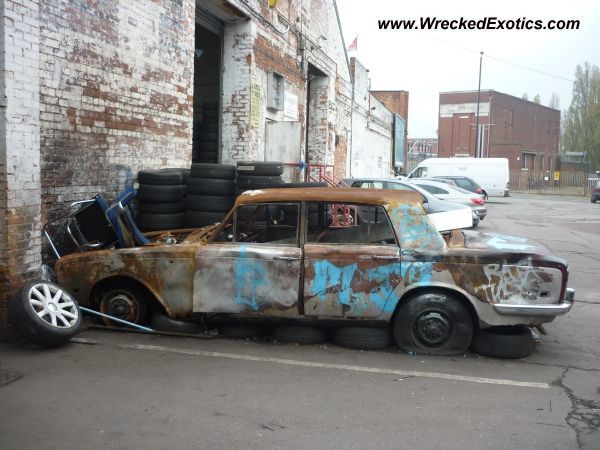Posted by William Ayerst on 05/04/2021 22:09:03:.
…
for the sake of completeness how would a Warco VMC (or equivalently priced mill £1500-2000) match up against the Bridgeport Series I, Tom Senior, Omninill, Centec 2B, etc. ?
…
I suspect my point about 'condition is everything' may not have sunk in. Would you buy this Rolls Royce?

In good working order, low mileage etc, it would sell for about £30,000 That one is scrap, worth about £50, plus the value of any spares that can be saved from it. Could be restored, but probably more time and money than it's worth unless done as a hobby.
Same problem with old machine-tools. Model and maker matter less than the machine's history. Many are in good order, others are scrap only, with all shades in between. Buying from a dealer will be more expensive because they have to make a profit and give some sort of warranty. Buying blind, the warranty may be more important than machine make or model, because there is no consumer protection in private sales! If an unscupulous private seller dumps a lemon on you, you might be stuck with it, with no chance of recovering your money. Private sales depend on good will, and there are naught people happy to dish up old tat and sell it on ruthlessly. We've had a few examples highlighted on the forum where machines didn't exist at all. Therefore, best to inspect secondhand before purchase, to make sure it's worth the money. Playing this game how good a second-hand machine was when new is almost irrelevant in my view.
A new Chinese hobby Mill will be cheaper, less trouble and perform better than a clapped out old banger, but it won't be as solid or smooth as an ex-industrial machine in good order. Hobby equipment is lightly built down to a price, and not made to do sustained hard-work. Industrial machines are made to do hard-work, and tend to be much heavier, which is good until you have to move it! They may also have difficult power requirements, such as a mixture of 3-phase and single-phase motors, and spares can be pricey. Keep in mind machines made to do hard work may have been flogged for a few decades and could be seriously worn out.
Of the machines listed, my preference would be for a Bridgeport, except it's a shade too big for my workshop. Not because the other mills are inferior, but the Bridgeport design happens to hit several sweet spots, making it particularly attractive for moderate workshops. Bridgeports aren't perfect, and I'll leave it to a Bridgeport owner to explain why they're popular, briefly big, but not too big, good rigidity and accuracy, plus well-placed controls and well laid out for general purpose work.
Always good to question requirements. If the plan is to enjoy British traditional machinery without commiting to anything else, refurbishing old machines is a worthwhile hobby in itself. If the goal is to start work immediately on light Model Engineering, then new Far Eastern is probably the best bet because they have consumer protection, can be sized to fit the space available, won't have funny power requirements, and the customer doesn't have to sort out delivery. I used to say machines were available off-the-shelf, but at the moment all suppliers look to be short of stock and may not have what you want. If the workshop is intended to tackle a serious commitment to biggish work, then it's worth looking carefully for what's needed on the ex-industrial market. Luck and where you live plays a part; but perhaps more important is your ability to assess machine tools and fix faults. Starting out I wasn't confident I could do that, and I bought Chinese to learn on, with the idea of upgrading when I knew the ropes. As it turned out the Chinese gear does all I need, and I haven't bothered to change it.
Dave
William Ayerst.







